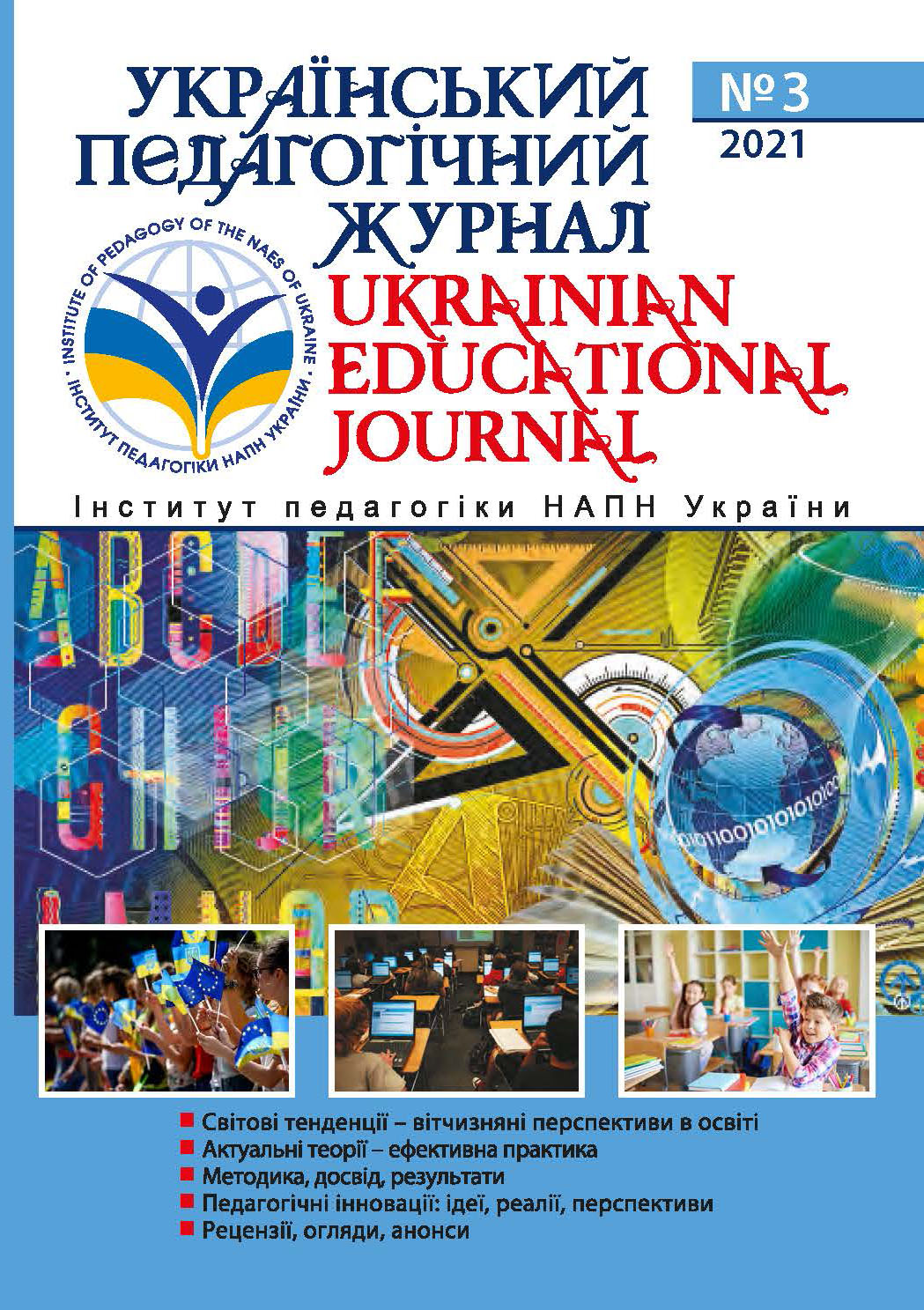Abstract
In the article, the author analyzes the activity of Kirovohrad regional out-of-school educational institutions as additional educational opportunities for students as an integral part of the general educational system of the region. In the context of the revival and reform of the national education system, out-of-school educational institutions are becoming an effective component of the educational structure. Institutions of regional subordination of Kirovohrad region complement school education and create a positive educational environment for students, open to every child, the environment that will help children discover their creative potential, creativity, abilities, attract them to the world of art, sports, science and technology. It is extracurricular activities that enable students, parents and teachers to get an additional tool for determining preferences and commitment to the direction of classes, which can ultimately become the basis of both professional activities and the dominant educational influence on the formation of a young personality. Currently, out-of-school educational institutions provide a diverse range of educational services that should protect the child from the negative impact of the street, sometimes the negative impact of the family, excessive fascination with social networks and the Internet in general. Extracurricular education is recognized by parents, the authorities, and the public as a necessary component of a child’s personality development, civic development, and professional choice.
Extracurricular educational institutions, as accessible educational institutions that enable students to receive additional educational services in the direction of acquiring knowledge, skills and abilities of interest, meet the needs of individuals in creative self-realization and content leisure, complement school education and create a positive educational environment. Institutions of this type expand the scope of educational services, meet the interests and needs of students, contribute to the formation of the personality of the future citizen, so the study of extracurricular education in the educational space of Kirovograd region is relevant for domestic pedagogical science. The article considers the system of functioning of out-of-school education of Kirovohrad region on the example of Kirovohrad regional out-of-school education institutions. Extracurricular education should be a constant object of attention and support from society as one of the important factors in the development of abilities and interests, social and professional self-determination of students.
References
О. В. Биковська, Позашкільна освіта: теоретико-методичні основи. Київ, Україна: АЛКОН, 2008.
В. В. Вербицький, Технологізація навчально-виховного процесу сучасного позашкільного еколого-натуралістичного навчального закладу: методичний посібник. Київ, Україна: АВЕРС, 2010.
Л. І. Ковбасенко, Методика виховної діяльності в Малій Академії наук України. Київ, Україна: АНП, Ін-т обдарованої дитини, 2009.
Національний еколого-натуралістичний центр учнівської молоді. [Електронний ресурс]. Доступно: https://nenc.gov.ua/old/1634.html. Дата звернення: Травень, 21, 2021.
Позашкільна освіта Міністерство освіти і науки. офіційний сайт. [Електронний ресурс]. Доступно: https://mon.gov.ua › tag › pozashkilna-osvita. Дата звернення: Травень, 21, 2021.
Про освіту. Закон України від 5 вересня 2017 року, № 2145-VIII. Офіційний сайт: Законодавство України. Доступно: https://zakon.rada.gov.ua.
Про позашкільну освіту Закон України. Офіційний сайт. Доступно: https://zakon.rada.gov.ua.
Г. П. Пустовіт, Позашкільна освіта і виховання: підручник. Київ, Україна: Педагогічна думка, 2013.
Статут Комунального закладу. [Електронний ресурс]. Доступно: https://drive.google.com/file/d/1-ZdLRtKZs2p2_FZFpx_hEzLiOCll4pdY/view. Дата звернення: Травень, 21, 2021.
Т. І. Сущенко, Позашкільна педагогіка. Київ, Україна: ІСДО, 1999.
Л. В. Тихенко, Розвиток творчих здібностей учнівської молоді в освітньо-виховній системі «Мала академія наук України». Суми, Україна: Університетська книга, 2007.
Центрально-український науковий ліцей-інтернат. [Електронний ресурс]. Доступно: http://portal.prolisok.org/. Дата звернення: Травень, 21, 2021.
O. V. Bykovs`ka, Pozashkil`na osvita: teoretyko-metodychni osnovy. Kyyiv, Ukrayina: ALKON, 2008. (in Ukrainian).
V. V. Verbycz`kyj, Texnologizaciya navchal`no-vyxovnogo procesu suchasnogo pozashkil`nogo ekologo-naturalistychnogo navchal`nogo zakladu: metodychnyj posibnyk. Kyyiv, Ukrayina: AVERS, 2010. (in Ukrainian).
L. I. Kovbasenko, Metodyka vyxovnoyi diyalnosti v Malij Akademiyi nauk Ukrayiny. Kyyiv, Ukrayina: ANP, In-t obdarovanoyi dytyny, 2009. (in Ukrainian).
Nacional`nyj ekologo-naturalistychnyj centr uchnivs`koyi molodi. [Elektronnyj resurs]. Dostupno: https://nenc.gov.ua/old/1634.html. Data zvernennya: Traven`, 21, 2021. (in Ukrainian).
Pozashkil`na osvita Ministerstvo osvity i nauky. oficijnyj sajt. [Elektronnyj resurs]. Dostupno: https://mon.gov.ua › tag › pozashkilna-osvita. Data zvernennya: Traven`, 21, 2021. (in Ukrainian).
Pro osvitu. Zakon Ukrayiny vid 5 veresnya 2017 roku, № 2145-VIII. Oficijnyj sajt: Zakonodavstvo Ukrayiny. Dostupno: https://zakon.rada.gov.ua. (in Ukrainian).
Pro pozashkil`nu osvitu Zakon Ukrayiny. Oficijnyj sajt. Dostupno: https://zakon.rada.gov.ua. (in Ukrainian).
G. P. Pustovit, Pozashkil`na osvita i vyxovannya: pidruchnyk. Kyyiv, Ukrayina: Pedagogichna dumka, 2013. (in Ukrainian).
Statut Komunal`nogo zakladu. [Elektronnyj resurs]. Dostupno: https://drive.google.com/file/d/1-ZdLRtKZs2p2_FZFpx_hEzLiOCll4pdY/view. Data zvernennya: Traven`, 21, 2021. (in Ukrainian).
T. I. Sushhenko, Pozashkil`na pedagogika. Kyyiv, Ukrayina: ISDO, 1999. (in Ukrainian).
L. V. Tyxenko, Rozvytok tvorchyx zdibnostej uchnivs`koyi molodi v osvitn`o-vyxovnij systemi «Mala akademiya nauk Ukrayiny». Sumy, Ukrayina: Universytets`ka knyga, 2007. (in Ukrainian).
Central`no-ukrayins`kyj naukovyj licej-internat. [Elektronnyj resurs]. Dostupno: http://portal.prolisok.org/. Data zvernennya: Traven`, 21, 2021. (in Ukrainian).

This work is licensed under a Creative Commons Attribution-NonCommercial-ShareAlike 4.0 International License.
Copyright (c) 2021 Лариса Ворона

